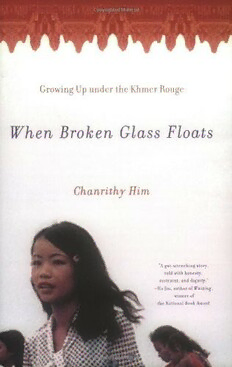
When Broken Glass Floats: Growing Up Under the Khmer Rouge PDF
02000·0.367 MB·English
Most books are stored in the elastic cloud where traffic is expensive. For this reason, we have a limit on daily download.
Preview When Broken Glass Floats: Growing Up Under the Khmer Rouge
Description:
Amazon.com Review "Chea, how come good doesn't win over evil?" young Chanrithy Him asks her sister, after the brutal Khmer Rouge have seized power in Cambodia, but before hunger makes them too weak for philosophy. Chea answers only with a proverb: When good and evil are thrown together into the river of life, first the *klok* or squash (representing good) will sink, and the *armbaeg* or broken glass (representing evil) will float. But the broken glass, Chea assures her, never floats for long: "When good appears to lose, it is an opportunity for one to be patient, and become like God." Before this proverb could come true, Chanrithy had to watch her mother, father, and five of her brothers and sisters die, murdered by the Khmer Rouge or fatally weakened by malnutrition, disease, and overwork. Now living in Oregon, where she studies posttraumatic stress disorder among Cambodian survivors, Chanrithy has written a first-person account of the killing fields that's remarkable for both its unflinching honesty and its refusal to despair. In wrenchingly immediate prose, she describes atrocities the rest of the world might prefer to ignore: her sick yet still breathing mother, thrown along with corpses into a well; a pregnant woman beaten to death with a spade, the baby struggling inside her; a sister impossibly swollen with edema, her starving body leaking fluid from the webbing between her toes. The mind retreats from horrors like these--and yet what emerges most strongly from this memoir is the triumph of life. Chanrithy is determined to honor her pledge to the dying Chea, to study medicine so she can help others live. *When Broken Glass Floats* accomplishes the same goal in a different way. "As a survivor, I want to be worthy of the suffering that I endured," Chanrithy writes; by giving such eloquent voice to her dead, she has proven herself more than worthy of her suffering--and theirs. *--Chloe Byrne* From Publishers Weekly Born in Cambodia in 1965, Him lived from the age of three with the fear of war overflowing from neighboring Vietnam and suffered through the U.S.'s bombing of her native land. However, thanks to her loving and open-minded family, her outlook remained positive--until 1975, when the Khmer Rouge seized control and turned her world upside down. (According to a Cambodian proverb, "broken glass floats" when the world is unbalanced.) Armed with a nearly photographic memory, Him forcefully expresses the utter horror of life under the revolutionary regime. Evacuated from Phnom Penh and and shunted from villages to labor camps, her close-knit family of 12 was decimated: both parents were murdered, and five of her siblings starved or died from treatable illnesses. Meanwhile, the culture of local communities was destroyed and replaced with the simple desire to survive famine. Yet for all their suffering throughout these years, the surviving Hims remained loyal to one another, saving any extra food they collected and making dangerous trips to other camps to share it with weaker family members. Friendships were also formed at great risk, and small favors were exchanged. But by the end of the book, Him finds herself surprised when she encounters remnants of humanity in people, for she has learned to live by mistrusting, by relying on her own wits and strength. When the Khmer Rouge were overthrown, Him moved to a refugee camp in Thailand. Today she works with the Khmer Adolescent Project in Oregon. This beautifully told story is an important addition to the literature of this period. (Apr.) FYI: In the January 17 issue, PW reviewed another memoir of growing up under the Khmer Rouge, First They Killed My Father by Loung Ung. Copyright 2000 Reed Business Information, Inc.
See more
The list of books you might like
Most books are stored in the elastic cloud where traffic is expensive. For this reason, we have a limit on daily download.
